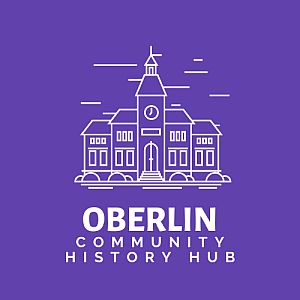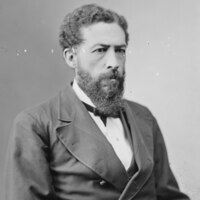John Mercer Langston
Title
John Mercer Langston
Description
A graduate of both Oberlin College and the Oberlin Theological Institute and a longtime resident of Oberlin, John Mercer Langston was one of the most accomplished Americans of the nineteenth century. A lifelong activist for racial equality, he blazed trails as a lawyer, poliitician, diplomat, and educator.
Birth Date
December 14, 1829
Birthplace
Louisa County, Virginia
Death Date
November 15, 1897
Occupation
Lawyer, Diplomat, College President, Congressman
Biographical Text
John Mercer Langston was born in Virginia, the youngest son of white plantation owner Ralph Quarles and one of his emancipated slaves, Lucy Jane Langston. His father’s will provided for him and his older brothers to be sent North to receive an education. After both parents died when Langston was only four, he and his brothers moved in with a family in Ohio.
Langston’s older brothers Gideon and Charles became the first two African American students to enroll at Oberlin College in 1835, and John Langston followed them to Oberlin in 1844, when he was just fourteen. He earned a BA and then an MA from the Oberlin Theological Department, but he really wanted to become a lawyer. Denied admission to law school because of his race, Langston instead apprenticed and read law under the guidance of an abolitionist judge in Elyria. In 1854, he was admitted to the Ohio bar, becoming the first black lawyer in the state of Ohio.
Langston’s career would be filed with many other firsts. In 1855, he was among the first Black elected officials in the country when he was chosen to serve as the town clerk of Brownhelm Township, west of Oberlin. After he and his wife, also an Oberlin graduate, moved back to Oberlin in 1856, Langston served on the Oberlin City Council and was elected to a term on the Oberlin Board of Education. He opened a successful law practice; among this clients was Edmonia Lewis, whom he defended against the charge that she poisoned two of her white friends in 1862.
Committed to abolitionism and the pursuit of racial equality, Langston assisted escapees fleeing slavery on the Underground Railroad. He served as the executive secretary of the Ohio Anti-Slavery Society, and he helped recruit black soldiers to serve in the Civil War. After the war, Langston was appointed an Inspector General of the Freedman’s Bureau, was active in the black convention movement, and founded the National Equal Rights League.
Langston’s family left Oberlin for Washington, DC in 1868. There Langston became the founding dean of the new law department at Howard University; he would also serve as the acting President of Howard. In 1877, President Rutherford B. Hayes appointed Langston the United States Minister to Haiti, a position he would hold until 1885. Langston returned to the states in 1885 after he was appointed the first president of the Virginia Normal and Collegiate Institute (now Virginia State University), a new institution of higher learning for African Americans.
Langston’s career held one more important first: in 1888, he was elected to the U.S. House of Representatives from the state of Virginia. At the time, white Democrats were trying to regain control of the state from a biracial coalition. Langston had to fight to get his victory recognized and as a result served only six months of his term. But he became the first African American elected to Congress from Virginia; there would not be a second until the 1970s.
John Mercer Langston’s life and career highlights both the promise of Emancipation and Reconstruction and the later retreat from black equality that followed. He died in 1897, just a year before a consequential Supreme Court decision that would make it easier for southern states to disenfranchise Black citizens. A town and HCBU in Oklahoma are named after Langston, as is the middle school in Oberlin. His Oberlin home was named to the National Registry of Historic Places in 1975.
Langston’s older brothers Gideon and Charles became the first two African American students to enroll at Oberlin College in 1835, and John Langston followed them to Oberlin in 1844, when he was just fourteen. He earned a BA and then an MA from the Oberlin Theological Department, but he really wanted to become a lawyer. Denied admission to law school because of his race, Langston instead apprenticed and read law under the guidance of an abolitionist judge in Elyria. In 1854, he was admitted to the Ohio bar, becoming the first black lawyer in the state of Ohio.
Langston’s career would be filed with many other firsts. In 1855, he was among the first Black elected officials in the country when he was chosen to serve as the town clerk of Brownhelm Township, west of Oberlin. After he and his wife, also an Oberlin graduate, moved back to Oberlin in 1856, Langston served on the Oberlin City Council and was elected to a term on the Oberlin Board of Education. He opened a successful law practice; among this clients was Edmonia Lewis, whom he defended against the charge that she poisoned two of her white friends in 1862.
Committed to abolitionism and the pursuit of racial equality, Langston assisted escapees fleeing slavery on the Underground Railroad. He served as the executive secretary of the Ohio Anti-Slavery Society, and he helped recruit black soldiers to serve in the Civil War. After the war, Langston was appointed an Inspector General of the Freedman’s Bureau, was active in the black convention movement, and founded the National Equal Rights League.
Langston’s family left Oberlin for Washington, DC in 1868. There Langston became the founding dean of the new law department at Howard University; he would also serve as the acting President of Howard. In 1877, President Rutherford B. Hayes appointed Langston the United States Minister to Haiti, a position he would hold until 1885. Langston returned to the states in 1885 after he was appointed the first president of the Virginia Normal and Collegiate Institute (now Virginia State University), a new institution of higher learning for African Americans.
Langston’s career held one more important first: in 1888, he was elected to the U.S. House of Representatives from the state of Virginia. At the time, white Democrats were trying to regain control of the state from a biracial coalition. Langston had to fight to get his victory recognized and as a result served only six months of his term. But he became the first African American elected to Congress from Virginia; there would not be a second until the 1970s.
John Mercer Langston’s life and career highlights both the promise of Emancipation and Reconstruction and the later retreat from black equality that followed. He died in 1897, just a year before a consequential Supreme Court decision that would make it easier for southern states to disenfranchise Black citizens. A town and HCBU in Oklahoma are named after Langston, as is the middle school in Oberlin. His Oberlin home was named to the National Registry of Historic Places in 1975.
Citation
“John Mercer Langston,” Oberlin Community History Hub, accessed May 2, 2024, https://megansmitchell.org/DH694/items/show/252.

